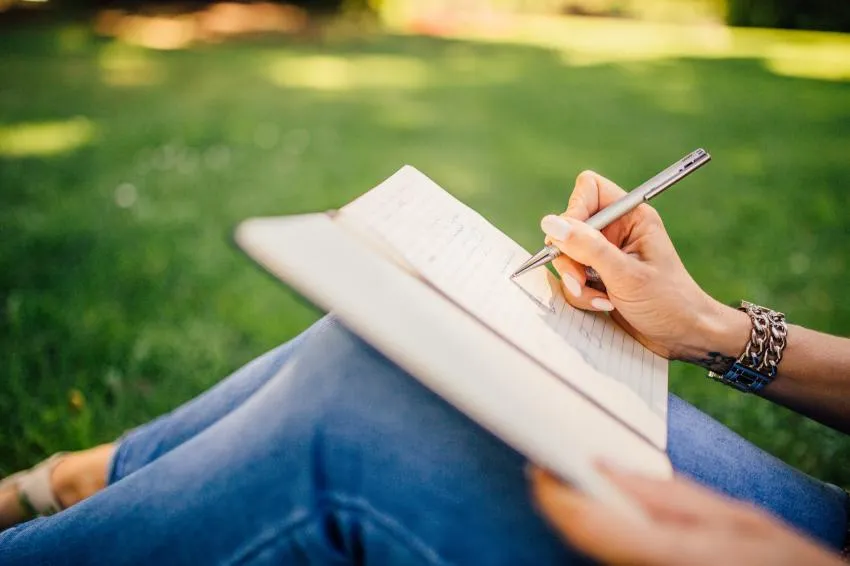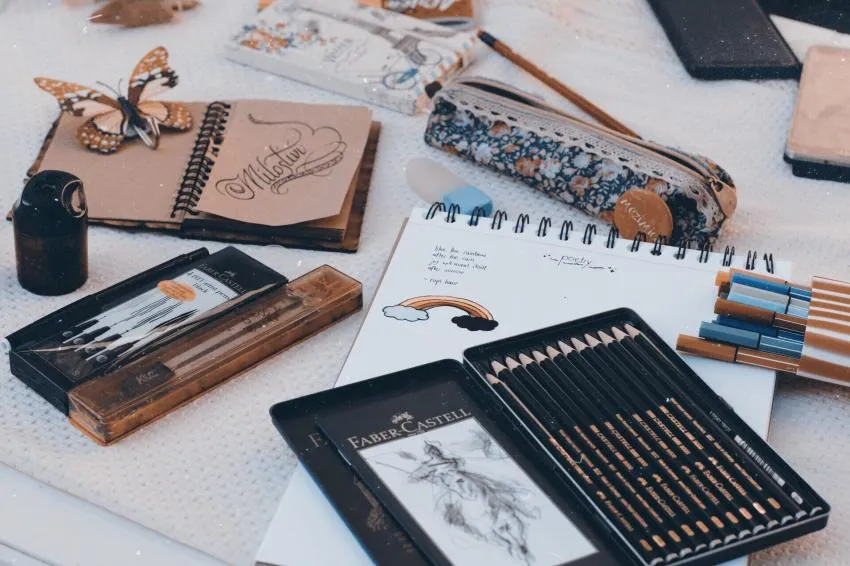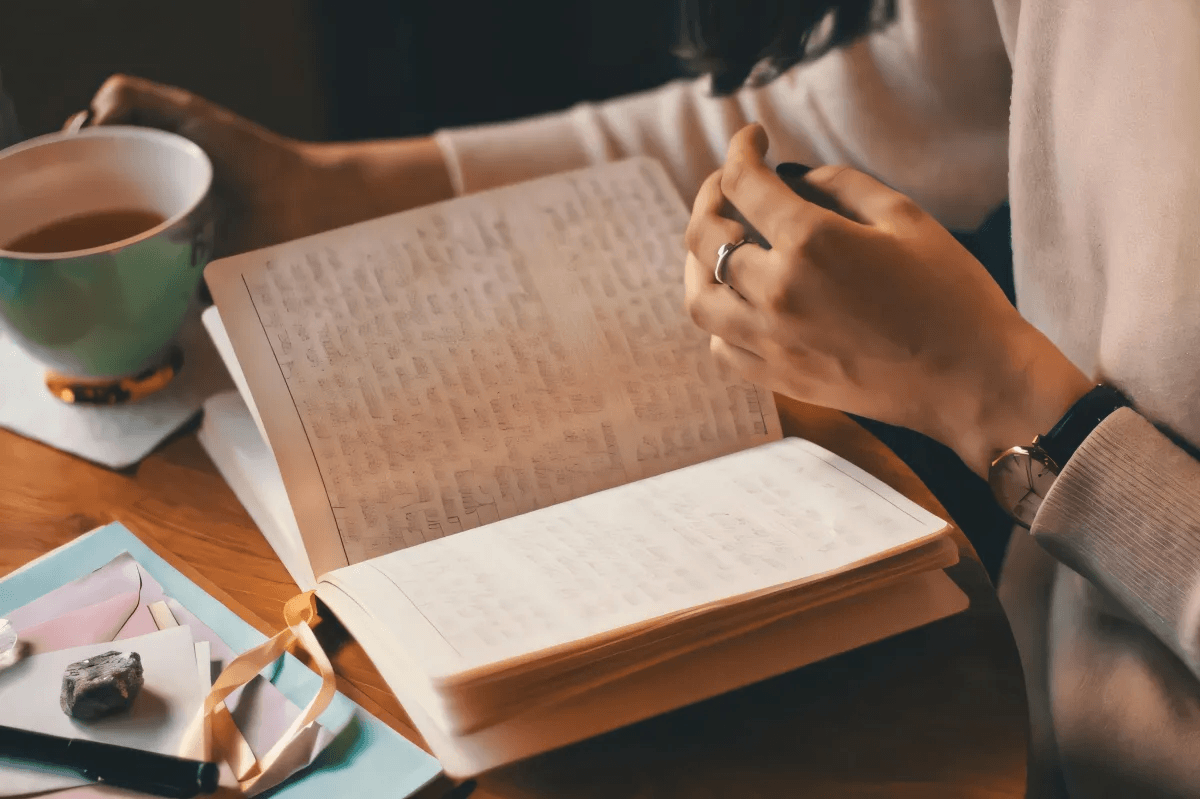How To Start A Journal And Actually Keep The Habit
The summer after I graduated high school, I decided to regularly keep a journal. Previously I would write sporadically if I found a journal while cleaning my room, or while on vacation. Ever since that decision, I’ve written an account of each day, sometimes detailed, sometimes simple, but always consistently. Over the years I’ve seen the benefits of keeping a journal, and will gladly share some tips and tricks for how to keep the habit of writing every day.
Benefits of Journaling
Here are the benefits of starting a journal.
1. Journaling helps you find clarity
Journals are a great place to start sorting through your thoughts and find clarity. This is the place you can say whatever you can’t or don’t want to say out loud. This is the place you get to call your boss a meanie weenie and no one will ever have to know. It’s like having a friend who’s waiting for you to open up so she can help you process... except she’s free at any and all hours of the day!
2. Helps in keeping a written account of your memories
It sounds simple enough, but it is actually very helpful to have a written account of your day-to-day life. Have you ever found a bank statement for something you don't remember buying? You can check your journal for that day, and realize you did actually buy that soda when you went out of town. You can remember what your aunt bought you for your baby shower to write a better thank you card. There are many times paperwork wants you to know an exact date, and your journal can do just that.
3. Journaling is a fun activity
Let's be honest, it's also pretty fun to know exactly what you were doing a year ago or beyond. You can read little details about your old job, your old roommate, your old city, etc. that you otherwise would have forgotten as new chapters in your life begin.
4. Helps you track goals
Journals can also be used as a goal tracker. It’s both a way to hold yourself accountable when figuring out your goals and a way to track your journey as you reach them. In moments when things seem difficult you can read notes to your future-self on why you want to reach those goals. Later you can also see how far you’ve come.

Find Your Reason for Writing And Maintaining a Journal
Here is how you can actually keep the habit of starting and regularly maintaining a Journal:
1. Ask Yourself Why
An important first step is to ask yourself WHY it is that you want to keep a journal. What are the things in your daily life worth writing down now, and worth reading about later? What do you want to remember?
It's each time you finished up a project at work you’re super proud of. Or how happy you were after taking that perfect museum trip with your friend visiting town. Start with those and get more detailed. What are the little things that would make you happy to remember a few months or years from now? Did a cute stranger compliment your new jacket? Did you find $10 on the sidewalk? Did anything quietly beautiful happen?
Sometimes the day-to-day doesn’t seem exciting enough to write about. In any case, you can start with simple things, the tv shows you’re watching, what you cooked for dinner, and then weave in more details about your life around it. Sometimes you start out writing about having pizza leftovers for lunch, then the next thing you know you’re writing about a realization you had about something that happened in the 10th grade.
Maybe your reason for writing is just to vent emotions, or to process your thoughts through a difficult event. Whatever your reason is, remember that it is important to you when you feel like putting off your entry for the day.
2. Find Your Structure for Writing
If you still aren’t sure of where exactly to start writing, or if you’re nervous about getting too personal, picture an archeologist reading your journal in 200 years. What would you want her to know about what it was actually like living in the year you do now? How much does milk cost? What sorts of things are you hearing on the news each night? How is everyone around you feeling about said news?
Your archeologist would absolutely love to know these things! Then, if you feel comfortable, slip in facts about what a jerk Mel was to you today, or how angry you suddenly felt running into your ex at the store, and remember your archeologist won’t judge you. She loves the historical knowledge you’re bringing her!
You can even start by writing your journal as a letter… even if you never plan on sending it. Write to it your future spouse, your future child, an existing child in your life, your cousin, your best friend, someone from high school who completely misunderstood you, or again your future archeologist.
3. Make it Fun!
Buy a notebook with a design you like. Buy a pack of glitter gel pens. Tape in ticket stubs. Use stickers! You can make your journal as fun as you want, and shopping around the stationary aisle might give you some extra motivation to open to the first page and actually start writing.

The problem is, actually putting ink onto paper, or putting a sticker somewhere feels super permanent. It’s intimidating enough to stop you from starting. However, just remember that once you finish a journal you get to start a new one, and then you can try something different!
Now that you have some fun supplies, you can build fun into your routine too. Drink tea, or hot cocoa as you reflect on your day. Listen to your favorite music, or even put on a low-stakes tv show in the background.
Don’t forget there are other ways to journal beside a basic diary entry of the day. You can also try a gratitude journal or bullet journaling.
Once you’ve started your journal, there are also some tips for how you can keep up the habit.
4. Write Around Your Schedule
There are many odd places around your day you can squeeze in writing an entry. Start writing in the small spaces you're free, and then if you run out of time it'll be easier to pick it back up later, especially if you do have a more regular writing time later in the day.
Write while you’re waiting for something (like dinner to cook,) while you’re winding down for the day, while you’re still in bed after waking up, while you watch your nighttime tv, while you’re in-between the things that fill your day and you’re not sure what to do with yourself. Find a routine that works for you.

5. On a Busy Day, Just Jot The Key Points Down
One issue you may run into is running out of time at the end of a busy day, or just being too tired to write your daily entry. If and when this happens there’s a simple trick I’ve used to not fall out of habit. I simply write down bullet points of my day on a sticky note or in a calendar that will later remind me of what happened. Then I get to writing with more attention and detail when I do have time.
Keep it simple, write down what hours you went to work, where you went that day, what you ate for lunch, and if you bought anything. This will jog your memory for later. Be warned that the uneventful days are the most difficult to recall if you don’t have notes to look back on.
6. If It's Difficult To Write, Just Skip It
If something is really difficult to write about, just skip it. You can tell your future self about what happened in another entry. Sometimes bad things happen to us, or we do things we don’t really want our future selves to remember. Sometimes things just make us too angry or sad. It’s better to skip it and keep writing than to end up stopping your writing altogether because you got stuck after you wrote “you’ll never guess what awful thing happened today, journal.”
Remember that ultimately your journal is yours. You get to decide how serious or detailed you get to be. You can decide on glitter pens with stickers or black ink on Moleskin.
Sometimes after you've truly built the habit of writing a little every day you won't even have to remind yourself. You'll automatically reach for your journal when it's time to write. Months or years from now you'll be thanking yourself for taking the time to give yourself a written record of the days you are living now.
Happy writing!
Opinions and Perspectives
I always date my entries. Future me will appreciate knowing exactly when things happened.
Documenting the small moments has become my favorite part. The big events I remember anyway.
Finding your own style is key. Took me years to stop trying to journal like other people.
The structured approach didn't work for me. I just write whatever comes to mind now.
Got inspired by this article to restart my journaling practice. Sometimes we just need a reminder why it's worth it.
I use voice recording when I'm too tired to write. Still captures the day's thoughts.
Does anyone else feel guilty when they skip a few days? I need to be better about not beating myself up.
Started journaling to improve my writing skills but stayed for the emotional benefits.
Those journals might be precious to them someday. They'll understand we all had struggles and feelings.
I'm worried about my kids finding my journals after I'm gone. Maybe I should destroy the really personal ones?
Writing about my travels has become my favorite part of journaling. Such great memories to look back on.
Never thought about using a journal during cooking time. Might try that instead of scrolling on my phone!
I use my journal to track my dreams. It's fascinating to look back at patterns over time.
The prompts actually helped me get started. Now I free write more but they were great training wheels.
Physical journals can be lost or damaged too. I keep digital backups of everything important.
I write my entries as if I'm talking to my best friend. Makes it feel more natural somehow.
Been journaling for 20 years now. The entries from my 20s are both hilarious and cringe-worthy!
I've found my evening journaling routine helps me sleep better. Anyone else experience this?
Actually basic supplies work just fine. It's the content that matters not the decoration.
Love the idea about making it fun with special pens and stickers, but I worry it'll get expensive.
This might sound weird but I journal in third person sometimes. Gives me a different perspective on situations.
I alternate between typed and handwritten entries depending on my mood and time available.
Never thought about using it to write better thank you cards. That's actually really practical.
Reading my old entries from the pandemic years is surreal. I'm glad I documented that time.
The archaeologist perspective really changed how I approach journaling. I include so many more daily life details now.
I always thought journaling was just for teenagers until I tried it at 45. Now I'm hooked!
My journal entries helped me realize I needed to change jobs. Sometimes you don't see patterns until they're on paper.
The tip about noting things during busy days is crucial. I keep a small notebook in my pocket for quick notes.
Just started journaling last week. This article gave me some great ideas to keep going.
I use my journal to draft letters I'll never send. It's incredibly cathartic.
Has anyone tried art journaling? I combine sketches with my writing and it's so fulfilling.
Interesting point about the costs of everyday items. I've started including prices of things in my entries.
I love the suggestion about writing what milk costs and current events. Future generations might find it fascinating.
My therapist recommended journaling and I thought it was silly at first. Now I'm a total convert.
Don't be so hard on yourself. Starting and stopping is part of building any habit.
The article makes it sound easier than it is. I've started and stopped so many times.
Write as if no one will ever read it. That's the only way to be truly honest with yourself.
Anyone else struggle with feeling like they need to censor themselves? I keep imagining someone reading it someday.
It took me a while to find my journaling groove but now it's like brushing my teeth just part of my daily routine.
I tried the gratitude thing but it felt forced. Not every approach works for everyone I guess.
Keeping a gratitude section in my journal has genuinely made me a more positive person.
The part about writing during cooking time resonates with me. I prop my journal on the counter while waiting for water to boil!
I scan my old journals and keep digital copies. Best of both worlds physical writing and digital storage.
I started journaling to track my fitness goals but it evolved into so much more. Now I can't imagine not doing it.
Try using a fountain pen! It naturally slows down your writing and improves legibility. Changed my journaling game completely.
My handwriting is terrible. Anyone else struggle with this? Sometimes I can barely read my own entries later!
The idea of writing to an archaeologist is fun, but I prefer writing to my future children. Helps me stay authentic.
I love going back and reading my old entries from college. It's amazing how many small details I would have forgotten.
Digital just isn't the same though. There's something special about putting pen to paper.
Have you considered password-protected digital journaling? It solved my privacy concerns completely.
Sometimes I worry about privacy. What if someone finds and reads my journal? It makes me hesitate to write openly.
The article mentions writing while watching TV but I find that too distracting. I need complete silence to journal properly.
I've found morning pages more effective than evening journaling. Anyone else prefer writing first thing?
My journal helped me through my divorce last year. It was like having a therapist available 24/7.
The tip about writing through uneventful days is so important. Those are actually the ones I love reading about years later.
Writing letters to my future self has become my favorite journaling method. It feels more purposeful somehow.
I never thought about using my journal to track exact dates for paperwork and receipts. That's actually brilliant!
As a busy parent, I've found bullet points work best for me. I can always expand later when I have more time.
You might want to reconsider that view on decorating journals. Making it visually appealing actually helps some of us stay motivated!
Not sure about the glitter pens and stickers approach. Feels a bit juvenile to me. I prefer keeping things simple and clean.
I actually disagree with the part about skipping difficult entries. I find writing about hard times most therapeutic, even if it hurts in the moment.
The suggestion about writing during small pockets of time is great! I've started journaling during my lunch break and it's working surprisingly well.
Has anyone tried bullet journaling? I'm curious about the difference between that and traditional journaling.
Honestly the tip about skipping difficult entries really resonates with me. I used to get stuck when something bad happened and then abandon journaling altogether.
I've been struggling with consistency. Some days I write pages, others nothing at all. Any advice on building a more regular habit?
Love the idea about picturing an archaeologist reading your journal in 200 years! It takes away the pressure of feeling like everything needs to be profound or deep.
I started journaling last month and it's already becoming such a therapeutic part of my daily routine. Anyone else find it helps with anxiety?
